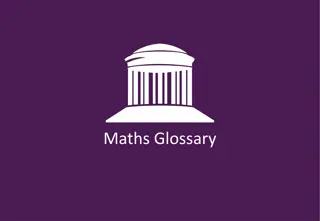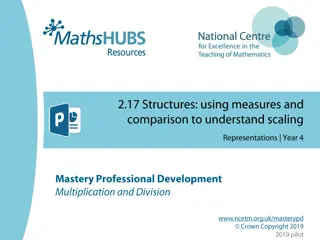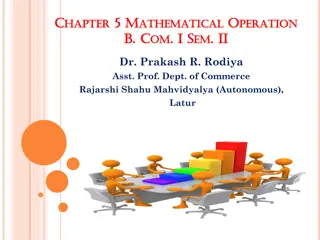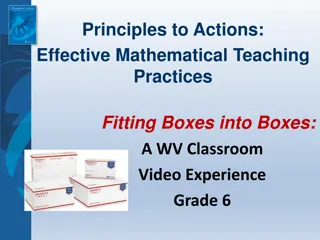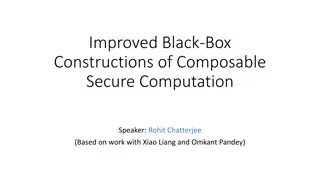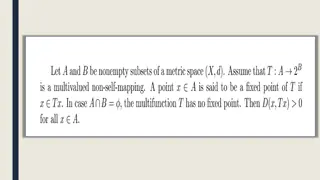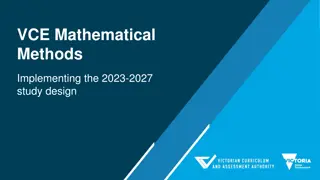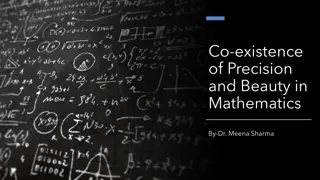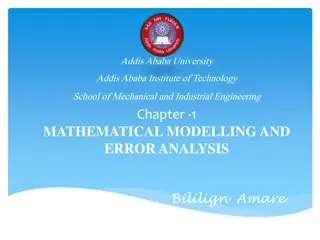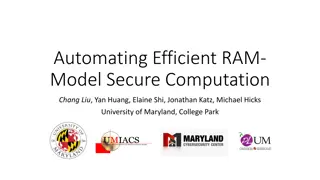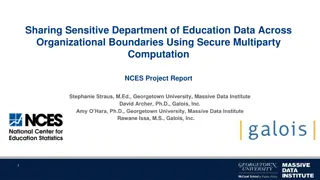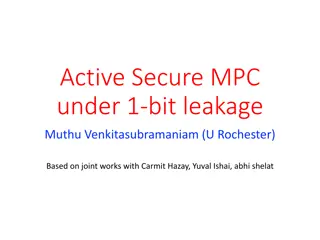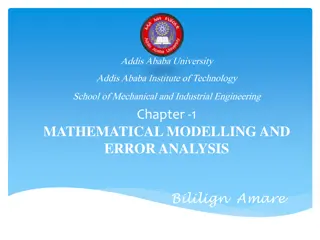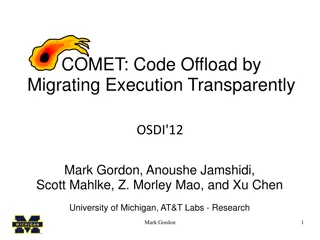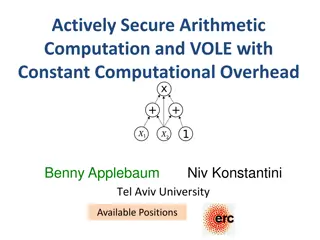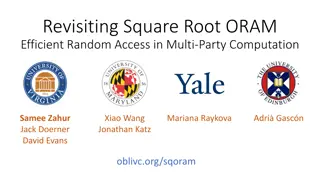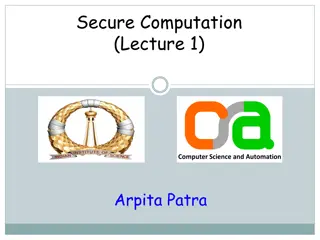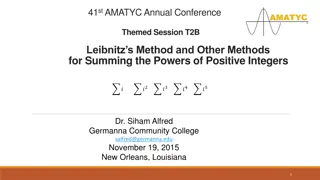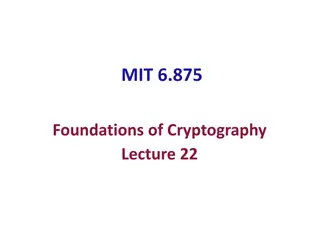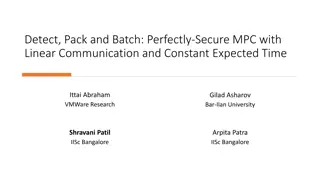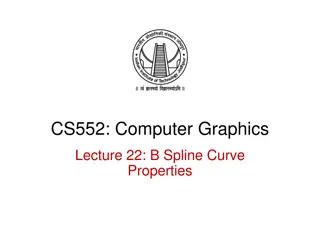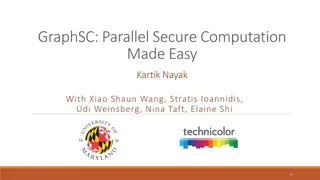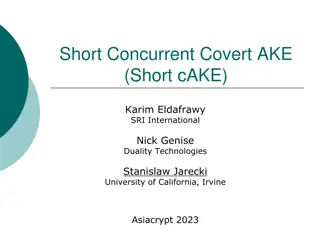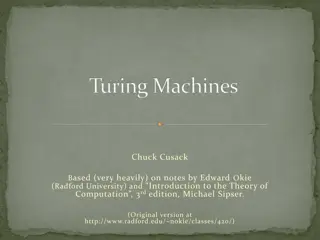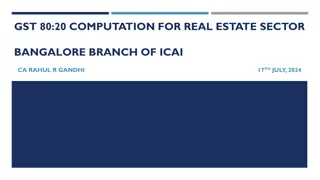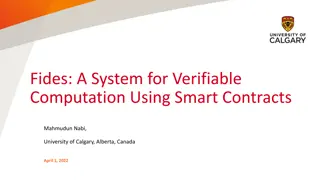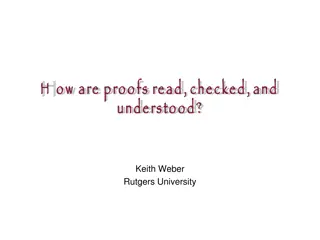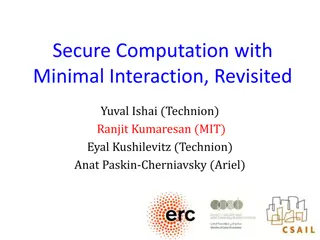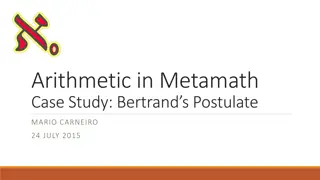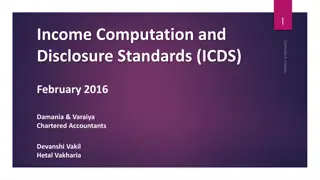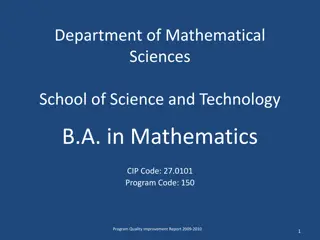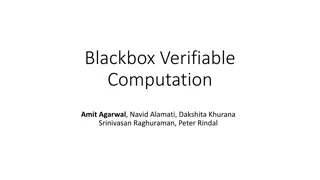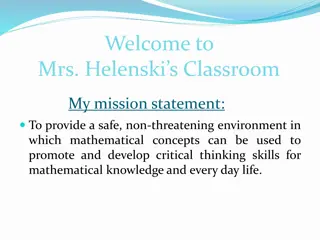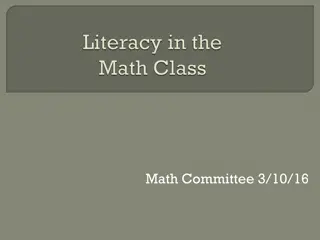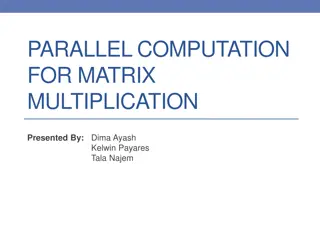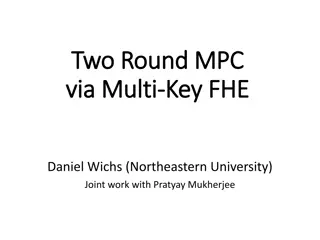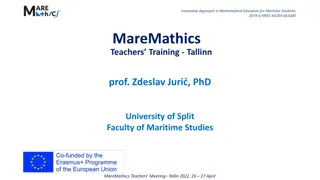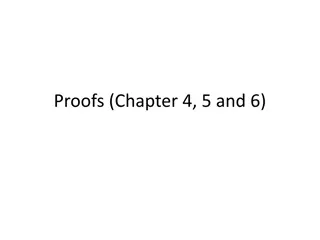Mathematical Checkpoints and Equations Activities for Year 7 Students
Engage Year 7 students in a series of 16 checkpoint activities and 12 additional activities focused on expressions, equations, and mathematical concepts. Explore topics like checks and balances, shape balance, equations from bar models, number line concepts, and more to enhance mathematical understa
3 views • 42 slides
Effective Strategies for Teaching Mathematics: Concrete, Pictorial, Abstract Approach
Utilizing concrete manipulatives, pictorial representations, and abstract symbols is a crucial method for enhancing mathematical understanding. This approach guides students from hands-on exploration to visual representation and ultimately to solving problems with symbols. By engaging in this progre
1 views • 25 slides
Evolution of Mathematical Theories and Proof Systems
Development of mathematical theories such as model theory, proof theory, set theory, recursion theory, and computational complexity is discussed, starting from historical perspectives with Dedekind and Peano to Godel's theorems, recursion theory's golden age in the 1930s, and advancements in proof t
1 views • 29 slides
Mathematical Relationships and Measurements Illustrated with Images
Explore various mathematical concepts such as measurements, proportions, and equations depicted through a series of images. From calculating ribbon lengths to understanding weight conversions, this visual journey provides a unique perspective on mathematical problem-solving and applications.
0 views • 22 slides
Mastering Symbol Substitution in Mathematical Operations
In the realm of mathematical operations, understanding symbol substitution is key to solving questions efficiently. Learn how to interchange mathematical signs and symbols to find the correct answer. With examples and guidance, grasp the concept of symbol substitution and excel in tackling such ques
0 views • 25 slides
Enhancing Mathematical Teaching Practices for Student Success
Explore the evolution of standards-based mathematics education reform through a 25-year journey, emphasizing the crucial role of effective teaching in ensuring mathematical success for all students. Discover the challenges faced in improving math education and the principles that guide meaningful le
0 views • 64 slides
Enhanced Security in Multiparty Computation
Explore the improved black-box constructions of composable secure computation, focusing on definitions, objectives, and the formalization basics of multiparty computation (MPC). Learn about the motivating security aspects in MPC and the real/ideal paradigm. Discover how MPC security involves compari
1 views • 68 slides
Mathematical Definitions and Theorems Illustrated
In this collection of images, various mathematical concepts are visually presented, including definitions, theorems, and proofs. The slides cover a range of topics in a structured manner, providing a concise overview of key mathematical principles. From foundational definitions to detailed proofs, t
0 views • 12 slides
Implementing the VCE Mathematical Methods 2023-2027 Study Design
The VCE Mathematical Methods study design for 2023-2027 includes a detailed outline of the curriculum, revisions in Units 1-4, investigations leading to assessments, and FAQs. The study design was the result of thorough consultation and review, published in February 2022 and accredited by VRQA. It f
5 views • 31 slides
Exploring the Harmony of Precision and Beauty in Mathematics
Delve into the intricate relationship between precision and beauty in mathematics as elucidated by Dr. Meena Sharma. Uncover the meaning and definition of these concepts through thought-provoking examples. Discover the nuances of precision and explore the distinction between accuracy and precision.
0 views • 8 slides
Mathematical Modeling and Error Analysis in Engineering
Mathematical modeling plays a crucial role in solving engineering problems efficiently. Numerical methods are powerful tools essential for problem-solving and learning. This chapter explores the importance of studying numerical methods, the concept of mathematical modeling, and the evaluation proces
0 views • 10 slides
Secure Computation Techniques in RAM Models with Efficient Automation
Explore the automation of efficient RAM-model secure computation techniques, including examples such as secure binary search. Discover how traditional solutions using circuit abstractions can be improved for sub-linear time computation through methods like Oblivious RAM. Learn about techniques such
0 views • 37 slides
Secure Multiparty Computation for Department of Education Data Sharing
This report discusses the use of Secure Multiparty Computation (SMC) to enable sharing of sensitive Department of Education data across organizational boundaries. The application of SMC allows for joint computation while keeping individual data encrypted, ensuring privacy and security within the Nat
0 views • 15 slides
Advancements in Active Secure Multiparty Computation (MPC)
Delve into the realm of secure multiparty computation under 1-bit leakage, exploring the intersection of DP algorithms, MPC, and the utilization of leakage for enhanced performance. Discover the overhead implications of achieving active security, as well as the evolution of secure computation protoc
0 views • 43 slides
Understanding Mathematical Modeling and Error Analysis in Engineering
Mathematical modeling plays a crucial role in problem-solving in engineering by using numerical methods. This involves formulating problems for solutions through arithmetic operations. The study of numerical methods is essential as they are powerful problem-solving tools that enhance computer usage
5 views • 10 slides
COMET: Code Offload by Migrating Execution - OSDI'12 Summary
The research paper discusses COMET, a system for transparently offloading computation from mobile devices to network resources to improve performance. It outlines the goals of COMET, its design, and evaluation, focusing on distributed shared memory and bridging computation disparity through offloadi
0 views • 31 slides
Actively Secure Arithmetic Computation and VOLE Study
Exploring actively secure arithmetic computation and VOLE with constant computational overhead at Tel Aviv University. Understanding how functions are represented in secure computation using arithmetic circuits over boolean circuits. Efficiently evaluating arithmetic circuits over large finite field
0 views • 36 slides
Enhancing Multi-Party Computation Efficiency Through ORAM Techniques
Explore the realm of efficient random access in multi-party computation through the reevaluation of classic schemes and the introduction of new approaches. Discover the potential of ORAM in improving performance and reducing costs in various computational tasks, such as secure multi-party computatio
0 views • 22 slides
Exploring Secure Computation in the Age of Information
Welcome to Secure Computation Lecture 1 by Arpita Patra. The course covers evaluation policies, projects, and references in the realm of secure computation. The content delves into the significance of information security across various sectors, emphasizing the importance of safeguarding sensitive d
0 views • 36 slides
Exploring Sums of Powers of Positive Integers Through Leibnitz's Method
Students are introduced to the computation of sums of powers of positive integers through Leibnitz's Method and other techniques in the context of finding areas under curves and exploring integration. The presentation delves into the origins of these formulas and their computation, reflecting on the
0 views • 24 slides
Secure Two-Party Computation and Basic Secret-Sharing Concepts
In today's lecture of "Foundations of Cryptography," the focus is on secure two-party and multi-party computation, emphasizing semi-honest security where Alice and Bob must compute without revealing more than necessary. Concepts such as real-world vs. ideal-world scenarios, the existence of PPT simu
0 views • 27 slides
Linear Communication in Secure Multiparty Computation for Efficient and Fast Processing
The research focuses on achieving perfectly secure multiparty computation (MPC) with linear communication and constant expected time. It explores efficient approaches using a broadcast-hybrid model and P2P communication, aiming to balance speed and efficiency in MPC. The study highlights the importa
0 views • 23 slides
Understanding B-Spline Curves: Properties and Derivatives
Explore the mathematical properties and derivatives of B-Spline curves in Computer Graphics, including basis functions, local control, interval, and derivative computation. Learn how to derive mathematical expressions for different properties and solve problems related to B-Splines. Understand the i
0 views • 13 slides
Secure Computation Challenges and Solutions in Data Mining
Exploring the intersection of secure computation and data mining, this content uncovers key challenges such as improving algorithms, converting programs for secure computation, and addressing parallelizability issues. It highlights the importance of cryptography in ensuring data privacy and presents
0 views • 30 slides
Covert Computation: Ensuring Undetectable Engagement
Covert computation aims to conceal the fact that computation is occurring and hide engagement in certain tasks like secure computation, authenticated key exchange, and more. By making messages indistinguishable and utilizing steganographic channels, it becomes possible to keep the activities covert
0 views • 16 slides
Overview of Turing Machines: Introduction, Tape, and Computation
Turing Machines are fundamental in the theory of computation, capable of recognizing all computable languages. They consist of a Finite State Machine combined with an infinite tape. The tape is initialized with input on the left end, and a TM's computation can either halt by entering special accept
0 views • 29 slides
Computation for Real Estate Sector in Bangalore Branch of ICAI
Practical overview of GST computation for real estate transactions in Bangalore, with details on old rates with ITC and new rate regime effective from April 1, 2019. The content discusses different transactions, conditions for new rates without ITC, and provides insights on the 80:20 computation met
0 views • 39 slides
Fides: A System for Verifiable Computation Using Smart Contracts
Fides presents a system for verifiable computation using smart contracts, focusing on blockchain basics, Ethereum, smart contracts, and outsourcing computation. It explores key components of blockchain, Ethereum's decentralized computing platform, properties of smart contracts, and the concept of ve
0 views • 25 slides
Understanding and Checking Mathematical Proofs
Reading and understanding mathematical proofs involves careful analysis of logic and reasoning. Mathematicians and students use various strategies to ensure correctness, such as examining assumptions, following step-by-step logic, and verifying conclusions. This process is crucial for grasping the v
1 views • 79 slides
Insights into Secure Computation with Minimal Interaction
This paper revisits the concept of secure computation with minimal interaction, focusing on the challenges and possibilities of achieving secure multiparty computation in 2 rounds. Specifically exploring scenarios with 3 and 4 parties, the study delves into the reasons for choosing n=3, n=4, and t=1
0 views • 23 slides
Exploring Metamath: A Computer Language for Mathematical Proofs
Metamath is a computer language designed for representing mathematical proofs. With several verifiers and proof assistants, it aims to formalize modern mathematics using a simple foundation. The Metamath-100 project is focused on proving a list of 100 theorems, with significant progress made in prov
0 views • 17 slides
Overview of Income Computation and Disclosure Standards (ICDS)
The Income-tax Act, 1961 introduced Income Computation and Disclosure Standards (ICDS) to be followed by certain assesses for computation of income. ICDS applies to taxpayers using the mercantile system of accounting from the Assessment Year 2016-17 onwards. Non-compliance with ICDS can lead to Best
0 views • 49 slides
Mathematics Program Quality Improvement Report 2009-2010 at Department of Mathematical Sciences
This report outlines the student-learning outcomes of the Mathematics program at the Department of Mathematical Sciences. It covers areas such as knowledge of mathematical content, reasoning and proof, mathematical representation and problem-solving, mathematical communication, and knowledge of tech
0 views • 29 slides
Blackbox Verifiable Computation Scheme Overview
This summarized content discusses the concept of blackbox verifiable computation, focusing on the challenges faced by clients and servers, the role of helper oracles, positive results utilizing homomorphic encryption, and background information on Random Self Reducible (RSR) functions. The protocol
0 views • 20 slides
Enhancing Critical Thinking Skills Through Mathematical Concepts in Mrs. Helenski's Classroom
Mrs. Helenski's classroom provides a safe environment where mathematical concepts are utilized to develop critical thinking skills for both mathematical knowledge and everyday life. With a focus on promoting metacognition in Geometry Honors, students are challenged to apply, prove, justify, and expl
0 views • 20 slides
Understanding Mathematical Literacy and Its Importance in Education
Recognizing the language of mathematics, understanding symbols, and being able to explain solutions are key components of mathematical literacy. It goes beyond merely answering questions correctly to encompass explaining reasoning and exploring concepts actively. The Standards for Mathematical Pract
0 views • 36 slides
Parallel Computation for Matrix Multiplication
Matrix multiplication is a fundamental operation with diverse applications across scientific research. Parallel computation for matrix multiplication involves distributing the computational workload over multiple processors, improving efficiency. Different algorithms have been developed for multiply
0 views • 36 slides
Advanced Techniques in Multi-Party Computation
Explore cutting-edge methods in Multi-Party Computation (MPC), including leveraging Fully Homomorphic Encryption (FHE) for minimal round complexity, constructing MPC directly via FHE techniques, and simplifying multi-key FHE constructions for efficient decryption. Learn about key concepts such as di
0 views • 17 slides
Innovative Approach in Mathematical Education for Maritime Students
Explore the innovative approach in mathematical education for maritime students as presented during the MareMathics Teachers Training and Meeting in Tallinn. The sessions covered topics such as mathematical applications in thermodynamics, including partial derivatives, derivations, and integrals wit
0 views • 11 slides
Understanding Mathematical Proofs and Concepts
Explore the world of mathematical proofs through chapters 4, 5, and 6. Delve into terminology, theorems, definitions, divisors, and accepted axioms used in mathematical reasoning. Discover the logic behind proofs and various methods employed in establishing the truth of mathematical statements.
1 views • 101 slides

